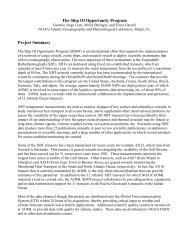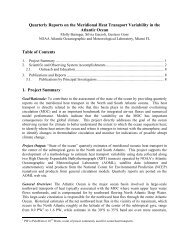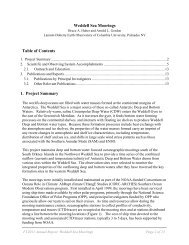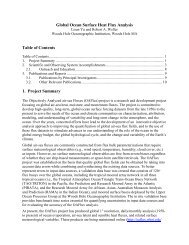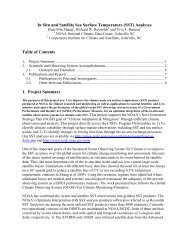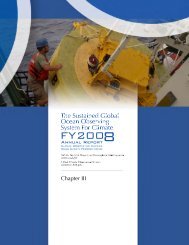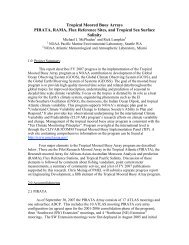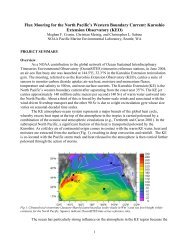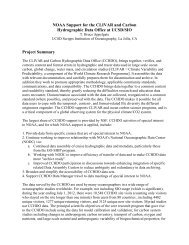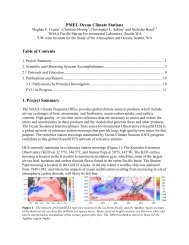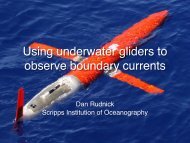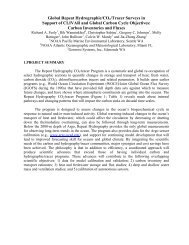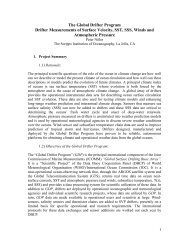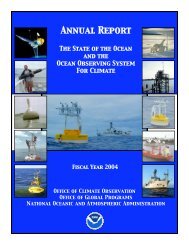GCOS Implementation Plan - WMO
GCOS Implementation Plan - WMO
GCOS Implementation Plan - WMO
You also want an ePaper? Increase the reach of your titles
YUMPU automatically turns print PDFs into web optimized ePapers that Google loves.
<strong>Implementation</strong> <strong>Plan</strong> for the Global Observing System for Climate in Support of the UNFCCC<br />
(2010 Update)<br />
<strong>GCOS</strong> is a system of observing systems built on the climate-relevant components of the established<br />
global observing systems for the atmosphere, ocean, land and surface water. The main component<br />
observing systems on which it is based are:<br />
• <strong>WMO</strong> Integrated Global Observing System (WIGOS);<br />
o WWW Global Observing System (GOS) for atmospheric physical and dynamical<br />
properties;<br />
o Global Atmospheric Watch for atmospheric constituent and chemical properties; and<br />
o other <strong>WMO</strong> climate related observing systems;<br />
• IOC/<strong>WMO</strong>/UNEP/ICSU Global Ocean Observing System (GOOS) for physical, chemical and<br />
biological properties of the ocean;<br />
• FAO/UNEP/UNESCO/<strong>WMO</strong>/ICSU Global Terrestrial Observing System (GTOS) for land surface<br />
ecosystem, hydrosphere, and cryosphere measurements; and<br />
• IGBP and WCRP and other research observing networks.<br />
The international climate programs and mechanisms which it supports, and through which it meets its<br />
objectives, include:<br />
• The World Climate Programme (WCP);<br />
• The World Climate Research Programme (WCRP) and related earth system research<br />
programmes including the International Geosphere-Biosphere Programme (IGBP), the<br />
International Human Dimensions Programme (IHDP) and DIVERSITAS;<br />
• The <strong>WMO</strong>/UNEP Intergovernmental Panel on Climate Change (IPCC); and<br />
• The United Nations Framework Convention on Climate Change (UNFCCC) and other<br />
international environmental conventions and agreements.<br />
<strong>Plan</strong>ning and implementation<br />
The planning, implementation and further development of <strong>GCOS</strong> are carried out by the sponsoring<br />
and participating organisations with scientific and technical advice and guidance from the joint<br />
<strong>WMO</strong>/IOC/UNEP/ICSU Steering Committee for <strong>GCOS</strong>. The Steering Committee carries out much of<br />
its work through three co-sponsored domain-based Panels, the Atmospheric Observation Panel for<br />
Climate (AOPC), the Ocean Observations Panel for Climate (OOPC) and the Terrestrial Observation<br />
Panel for Climate (TOPC). The interface with the <strong>WMO</strong>/IOC/ICSU World Climate Research<br />
Programme (WCRP) is co-ordinated through the jointly-sponsored WCRP/<strong>GCOS</strong> Observations and<br />
Assimilation Panel (WOAP). The Steering Committee is supported by the <strong>GCOS</strong> Secretariat located<br />
at <strong>WMO</strong> Headquarters in Geneva.<br />
The initial plan for <strong>GCOS</strong> (<strong>GCOS</strong>-14), which was issued in 1995, set down the overall strategy and<br />
implementation framework. A series of Regional Action <strong>Plan</strong>s for ten developing country regions<br />
provided guidance for key regional needs and a <strong>GCOS</strong> Co-operation Mechanism (GCM) was put in<br />
place to provide for a co-ordinated multi-government approach to funding the key implementation<br />
activities in developing countries.<br />
The <strong>Implementation</strong> <strong>Plan</strong> for the Global Observing System for Climate In Support of the<br />
UNFCCC (IP-04)<br />
Through its Articles 4 and 5, the UNFCCC commits Parties to support international efforts to<br />
strengthen systematic observation capacities and capabilities, particularly in developing countries,<br />
and to promote access to, and the exchange of, data and analysis from areas beyond national<br />
jurisdictions. In 1997, the UNFCCC Conference of the Parties (COP) called for an assessment of the<br />
adequacy of global observations to meet the needs of the Convention. This lead to the First (1998)<br />
and Second (2003) Adequacy Reports with the Second Adequacy Report (<strong>GCOS</strong>-82) identifying a set<br />
of “Essential Climate Variables” (ECVs) “that are both currently feasible for global implementation and<br />
have a high impact on UNFCCC requirements.” Through its Decision 11, the Ninth (2003) Session of<br />
the COP requested the “development of a phased 5- to 10-year implementation plan for the integrated<br />
137



